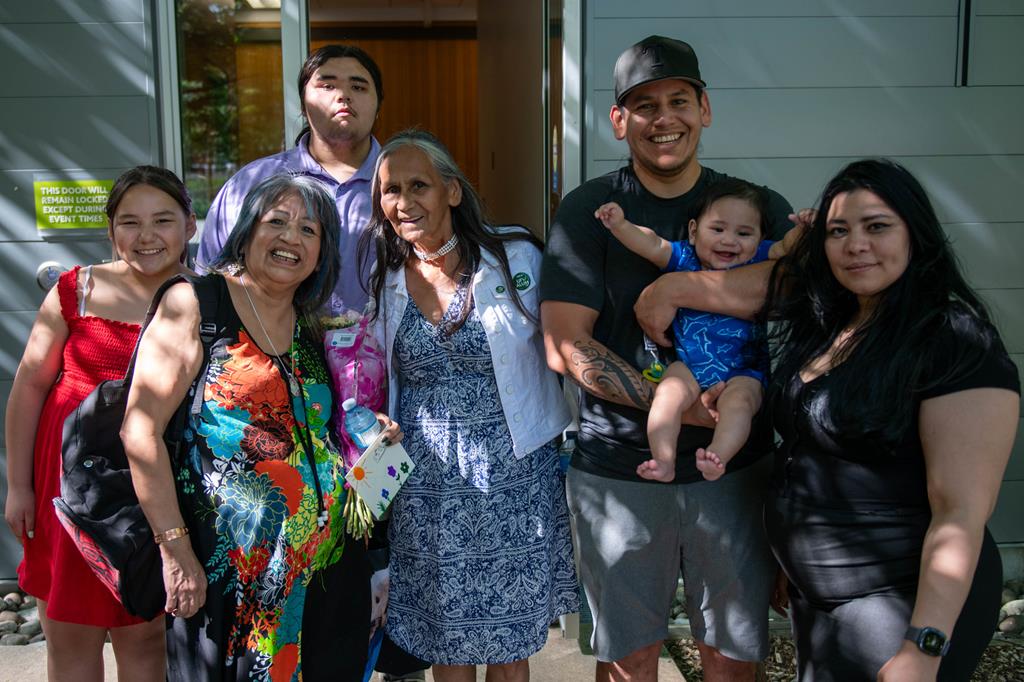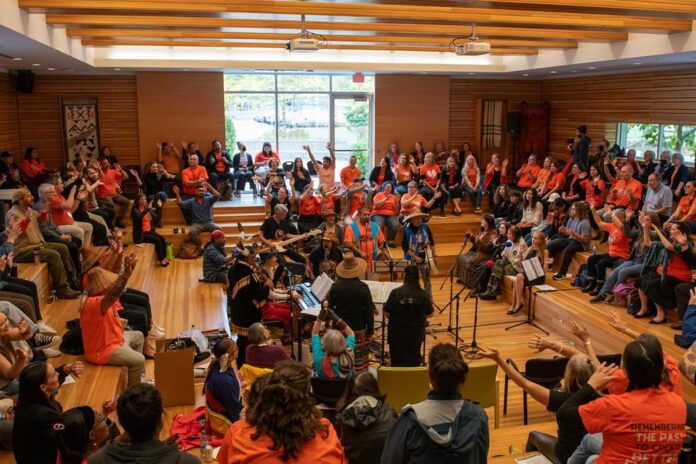In September of 2005, UFV committed to “Indigenizing our Academy to strategically plan post-secondary education for Aboriginal communities in traditional Stó:l? territory.” Making strides over the years, such as implementing an Indigenous Studies Bachelor degree and certificate, and prioritizing the revitalization of the endangered Salishan language dialect of Halq’eméylem through certificates and diplomas. Indigenization and decolonization within institutions that were built in the ideals of traditional, Western education — like UFV — is no small feat. It requires dismantling a system of power not only with marginalized people in mind, but with the support and reflective involvement from those communities.
The Indigenous Student Centre (ISC) offers continued post-secondary support for status and non-status First Nation, Inuit, or Métis students. Students eligible to receive their services, like the Elder Support program, are Indigenous to Turtle Island, meaning they are the “original inhabitants of the land that is now called Canada.” If you are not Indigenous, these services are not for you. This is an important thing to note, as mis-identifying yourself when going through UFV student intake takes time away from ISC staff that could otherwise be spent supporting Indigenous students.
I asked what indigenization means to Christie, the Indigenous student engagement & transition coordinator.
“Indigenization is the idea that we incorporate Indigenous ways of knowing and pedagogy within every aspect of the institution. It’s not just having an ISC, but also having opportunities for Indigenous representation throughout the university, from classrooms to events, to when someone orders a cup of coffee — they see some sort of indigenization; it is embedded.”

(Piqued by her statement, I looked for some coffee related evidence of indigenization at UFV… I was proud to find that our dining services do provide us with Spirit Bear Coffee, a hyperlocal, fair trade Indigenous coffee company. I wish it were the same for Fair Grounds, but they source organic, fair trade coffee from Salt Spring Coffee).
The ISC roots its work in the truth that a vital process of indigenization lies in representation.
“At the Chilliwack campus Indigenous folks make up to 10 percent of the population. So, 10 percent of our faculty and employees should be Indigenous. It’s about adequate representation. When you walk into a meeting, you want to see Indigenous people sitting at the table. You want to see an Indigenous department, and you want to see Indigenous people running it.”
Carlson acknowledges that indigenization will look different in each department in education. It may be harder to implement decolonial learning in a physics class compared to history, but what matters is making Indigenous presence the norm, from the language we use to the practices we uphold — not just in the artwork on the walls. A simple example was to shift our language from “seniors” or “old people” to “elders,” a term that shows respect and creates a community.
“Right now, if you’re a professor from UFV and you retire, that’s basically, ‘bye, bye, see ya.’ Why aren’t we honouring our elders? If we have elders here who carry wisdom, lived experience — are we inviting those retired faculty back? Are we inviting those retired staff members back? Those who have that knowledge? Who built this place?” said Carlson.
The weight of educating settlers on Indigenous ways of knowing does not fall on the shoulders of Indigenous communities and knowledge keepers. In fact, as settlers, it is our responsibility to take action toward understanding our own positionality as it relates to our presence on campus, in the Fraser Valley, and as people living in Canada.
Christie, Kozma, and Watt all agreed that allyship begins with education: “Start learning Indigenous terminology — Turtle Island is North America. Indigenous means from the land.”
Carlson does not believe that sanitizing difficult course content builds educated individuals, but that being armed with proper terminology and theories is the way to personal empowerment.
“We need to have those difficult conversations. Deal with those difficult subjects, but in a way that is sensitive to people with intergenerational trauma, people who are from racialized communities, people who are from genders that have been oppressed and overlooked. That anyone from a marginalized community, anyone who is Indigenous, has the support — intellectual, emotional, psychological, financial — to deal with all of those hard questions and all of that tough learning you need to succeed in the world today.”
And Carlson is doing just that, not only in his research with the Stó:l? people and in his classes at UFV, but through Xwelítem Siyáya: Allyship and Reconciliation Building with the Peace and Reconciliation Centre (PARC). The program is open to the community, with professional development spots saved for those working in close connection with Indigenous communities, like RCMP officers and BC Parks Conservation officers. The year-long program of about 100 participants creates an environment that is humble and equitable, exploring topics like “Indigenous resurgence, reconciliation, settler colonialism, and white privilege. The program offers a foundational knowledge to people so that they can build from that.”
Even the term “reconciliation” is a false start, as it is a colonial notion that also implies that there was a positive relationship between Indigenous people and Canadian society — that a relationship that can be reconciled existed. Carlson explores the word.
“In the Christian world, if you sin, you break your connection to God and to your community. The only way for you to rebuild that connection, to reconcile, is to acknowledge your sin. Say that you’ve done wrong, do penance to make up for that sin, to compensate the person who’s been hurt, and then you will have reconciliation with the community and with God. The Fraser Valley is often referred to as the Bible Belt, right? So for people who come from that tradition, just embrace that term from your own Christian tradition.”
Embracing (re)conciliation as settlers means taking responsibility for the role we play in creating equitable spaces. It’s reading this article, listening to your peers (especially those from marginalized communities), and educating yourself. Luckily, here at UFV, there are no shortage of classes that explore, interrogate, and question settler colonialism — here’s a short list for next semester: HIST 103, ENGL 253, IPK 302, POSC 301, SOWK 320, BUS 400.
Kiara Okonkwo is a writer and creative. She received a diploma in Screenwriting from Vancouver Film School and is pursuing her Bachelor of Fine Arts in Creative Writing and Media and Communication Studies. Kiara values self-expression and authenticity.


